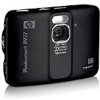HP Photosmart R930 User Guide - Page 58
Safety precautions for recharging batteries, Charge location, Average, charge time, Signals, Charging
 |
View all HP Photosmart R930 manuals
Add to My Manuals
Save this manual to your list of manuals |
Page 58 highlights
Appendix A The following table shows the average recharge time for a fully discharged battery, based on recharge location. Charge location Average charge time In camera connected to AC 2-3 hours power via the power adapter In camera connected to a 4-6 hours computer or printer via the USB cable In an HP Photosmart RSeries quick recharger 1 hour Signals Charging: Camera's battery charging light blinks and the animated battery icon is displayed. Charging complete: Camera's battery charging light turns on solid and the battery gauge changes to on the Image Display. Charging: For most computers and printers, camera's battery charging light blinks and the animated battery icon is displayed, but see the note at the end of this table. Charging complete: Camera's battery charging light turns on solid and the battery gauge changes to on the Image Display. Charging: Quick recharger light is yellow. Charging complete: Quick recharger light is green. NOTE: Some printers and computers provide lower power via the USB connection. If you are charging using the USB cable connected to one of these printers or computers, the camera's battery charging light may not blink while the battery is charging, but will turn on solid when charging is complete. Safety precautions for recharging batteries You can recharge a Lithium Ion battery in the camera or purchase an optional quick recharger. These devices may be warm while charging a Lithium Ion battery. This is normal. However, you should follow the safety precautions below. • Do not charge any other battery than the HP Photosmart R07 Lithium Ion battery in the camera or quick recharger. • Insert the Lithium Ion battery in the correct orientation. • Use the camera or quick recharger in a dry location only. • Do not charge a Lithium Ion battery in a hot location, such as in direct sunlight or near a fire. • When recharging a Lithium Ion battery, do not cover the camera or quick recharger. • Do not operate the camera or quick recharger if the Lithium Ion battery appears damaged. • Do not disassemble the camera or quick recharger. • Unplug the quick recharger from the electrical outlet before cleaning it. • After extensive use, the Lithium Ion battery may begin to swell. If it becomes difficult to insert the battery into or remove the battery from the camera or quick recharger, discontinue use of the battery and replace it with a new one. Please recycle the old battery. 56 Managing batteries















